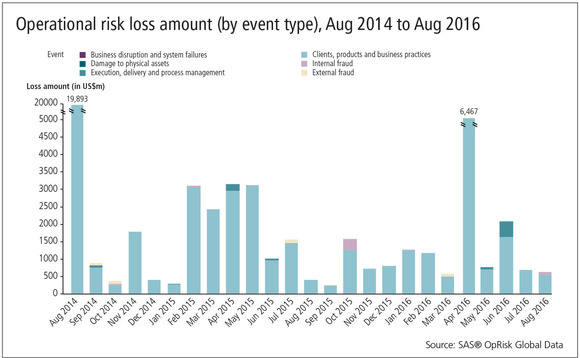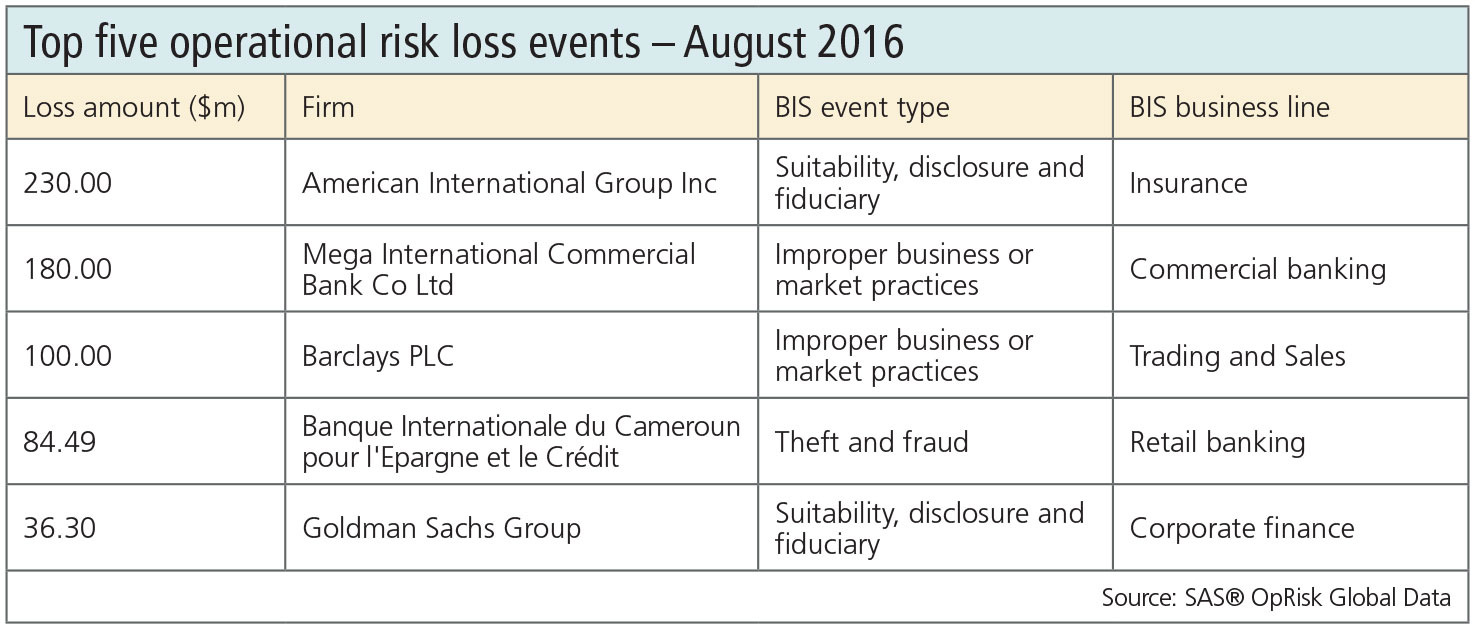
AIG hit by $230 million settlement over MedPartners
Megan van Ooyen from SAS rounds up the top five op risk losses for August

In August, financial services firms suffered some nasty operational risk losses as a result of problems such as market manipulation, misconduct and poor anti-money laundering (AML) compliance.
But the largest loss stemmed from a class action lawsuit against insurance giant AIG.
In the late 1990s, MedPartners, a physician practice management company that now operates as CVS Health, touted its fast-growth strategy, but a failed merger in 1998 called those claims into question. Fearing shareholder retaliation, MedPartners shored up its defences with an unlimited excess coverage policy from AIG.
As expected, disgruntled shareholders filed securities fraud lawsuits accusing the company of publishing false and misleading statements. The consolidated class action lawsuit sought $750 million in damages, but MedPartners claimed it was on the verge of bankruptcy. Shareholders knew the company had a directors and officers insurance limit of $50 million, so they decided to take what they could get and settled for $56 million in 1999.
Neither MedPartners nor AIG mentioned the unlimited excess coverage policy.

Click here to enlarge, or tap image on app
Inevitably, shareholders learned of the policy. They filed a second lawsuit in 2003 accusing AIG and MedPartners of fraud. The companies argued MedPartners had disclosed the policy in December 1998. It was not their fault, they reasoned, if the shareholders' lawyers had misunderstood the carefully worded press release.
The prospect of a trial motivated both parties to seek a resolution in early 2016. The judge approved a combined settlement of $310 million – including $230 million from AIG – on August 15.
Last month's second largest op risk loss occurred at Mega International Commercial Bank, which settled a dispute with the New York Department of Financial Services (DFS) for $180 million. The settlement follows a DFS examination of Mega Bank's New York branch in 2015, which found serious and systemic AML compliance problems.
According to the regulator, the compliance structure of Mega Bank's New York branch was a mess. Senior compliance officers also served as operational officers – a conflict of interest between their business and compliance obligations. Furthermore, many of those officers, including its Bank Secrecy Act/AML compliance officer and chief compliance officer, had little training in US regulations. The problem was compounded by language barriers, unclear transaction monitoring and reporting policies, and out-of-date surveillance monitoring criteria.
The AML deficiencies came to a head in Panama, where Mega Bank operated two branches. Reports link certain bank customers with Mossack Fonseca, the now-infamous law firm accused of aiding and abetting money laundering and tax evasion. Despite numerous red flags – and contrary to its own internal policies – Mega Bank allegedly never performed adequate due diligence on billions of dollars in transactions processed between New York and Panama.
The DFS presented its findings to Mega Bank in February 2016. Although the bank dismissed the regulator's concerns and challenged much of the report, it agreed to settle. Meanwhile, Mega Bank faces further investigations in the US and Taiwan.

August's third biggest op risk loss is part of an ongoing saga: the Libor scandal.
In this chapter, the US states of New York and Connecticut led a multi-state enquiry into the affair. They alleged Barclays Bank and Barclays Capital knowingly colluded with other panel banks to manipulate US dollar Libor rates. This meant investors lost out, so the states accused Barclays of willfully defrauding government entities and non-profit institutions.
The UK bank has a history of co-operating with Libor investigations, and did so again in this case. The states continue to pursue other panel banks, so Barclays' $100 million payout sets the benchmark for future settlements.
The final two losses in August's top five list involve internal misconduct.
 Megan van Ooyen
Megan van Ooyen
In Cameroon, authorities arrested four current and former employees of French bank BPCE's local subsidiary, BICEC. The former director-general, former director of accounting, and two others allegedly used various schemes to steal an estimated $84.49 million between 2003 and 2015. BICEC fired the director-general three months before the arrests, but withheld its reasons for doing so. The bank also declined to confirm any loss speculation and did not offer additional details regarding the means of fraud. It has, however, filed a lawsuit against unspecified individuals in an attempt to recover the stolen funds.
Back in the US, a $36.3 million penalty levied on Goldman Sachs by the US Federal Reserve Board rounds out this month's top five op risk losses.
The trouble began in May 2014 when Goldman Sachs hired Rohit Bansal, a former bank examiner at the Fed's New York office, and placed him on a team with Joseph Jiampetro. According to the Fed, Jiampetro turned a blind eye when Bansal reached out to Jason Gross, his former colleague at the Fed. Gross provided Bansal with memoranda and internal correspondence regarding a client's upcoming review, as well as documents describing the Fed's assessment framework and examination rating process.
Scott Romanoff, the partner supervising Jiampetro's team, became suspicious in September 2014 and reported his concerns to Goldman's investment banking compliance division. The firm subsequently sacked Bansal and Jiampetro.
The DFS investigated the incident and fined Goldman $50 million in October 2015, while the Fed concluded its own probe more recently. The central bank found that Goldman's employees obtained confidential regulatory information illegally and used it to solicit business for the firm. The Fed also cited Goldman for having inadequate policies, procedures, and training in place to ensure employees didn't obtain or use confidential supervisory information without authorisation.
Only users who have a paid subscription or are part of a corporate subscription are able to print or copy content.
To access these options, along with all other subscription benefits, please contact info@risk.net or view our subscription options here: http://subscriptions.risk.net/subscribe
You are currently unable to print this content. Please contact info@risk.net to find out more.
You are currently unable to copy this content. Please contact info@risk.net to find out more.
Copyright Infopro Digital Limited. All rights reserved.
As outlined in our terms and conditions, https://www.infopro-digital.com/terms-and-conditions/subscriptions/ (point 2.4), printing is limited to a single copy.
If you would like to purchase additional rights please email info@risk.net
Copyright Infopro Digital Limited. All rights reserved.
You may share this content using our article tools. As outlined in our terms and conditions, https://www.infopro-digital.com/terms-and-conditions/subscriptions/ (clause 2.4), an Authorised User may only make one copy of the materials for their own personal use. You must also comply with the restrictions in clause 2.5.
If you would like to purchase additional rights please email info@risk.net
More on Risk management
Op risk data: Mastercard schooled in £200m class action
Also: Mitsubishi copper crunch, TD tops 2024 op risk loss table. Data by ORX News
Diversification of LDI liquidity buffers sparks debate
Funds using credit assets to top up collateral waterfall, but some risk managers are sceptical
Transforming stress-testing with AI
Firms can update their stress-testing capability by harnessing automated scenario generation, says fintech advocate
Basel stops short on wrong-way risk
New guidelines a step in right direction, but experts warn they won’t prevent another Archegos
On resilience risk, banks prepare to let the bad times roll
Lenders bolster first-line teams and upskill boards as compliance with new rules bites
Complex EU active account reporting could drive trades out of UK
Draft Emir rules might not force large volumes to move to EU, but will make compliance difficult
Strategies for navigating market volatility in the post-US election landscape
This article examines the key themes of a recent webinar, sponsored by S&P Global Market Intelligence, on market volatility following the US election, including inflation risks, commodities, geopolitical uncertainty, ESG considerations and the role of…
Risk.net’s top 10 investment risks for 2025
Fresh concerns this year include a trade war, a stock market crash and growing social discord







